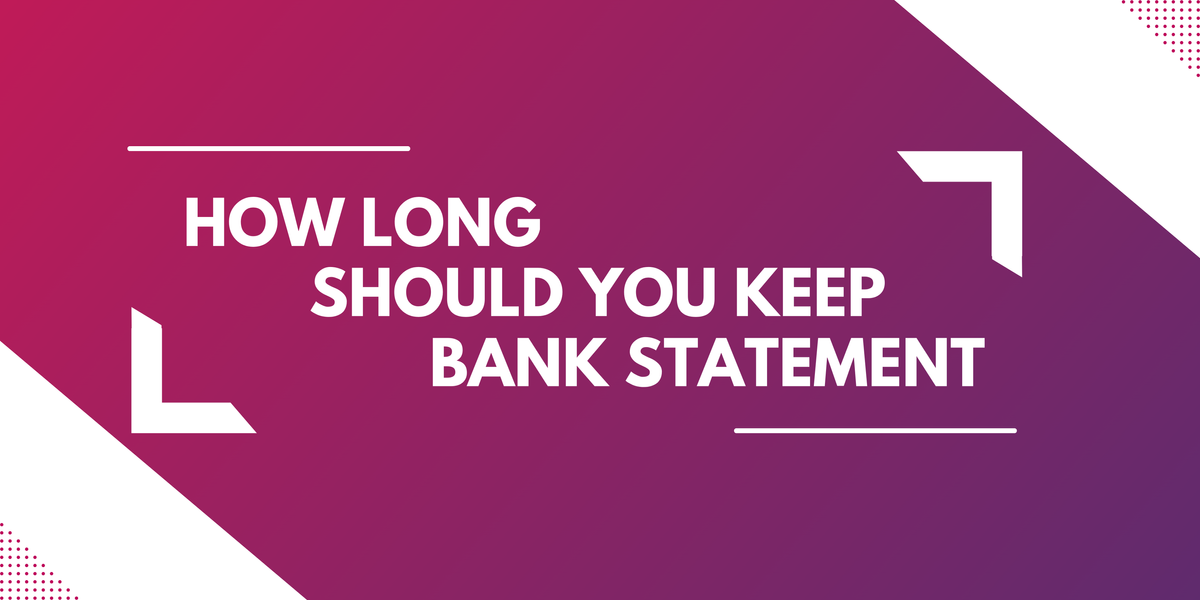If you’ve ever found yourself with a growing pile of paper bank statements taking up space, you’re not alone. Managing financial documents can feel overwhelming, and you may wonder: how long should I keep my bank statements?
Knowing the answer is more than just a matter of decluttering. Retaining bank statements for the right amount of time ensures you’re prepared for tax season, disputes, or audits, while also keeping your financial history organized.
This guide will help you understand the importance of managing your records and how to determine the ideal retention period for your bank statements.
How Long Should You Keep Bank Statements
Knowing how long to keep your bank statements is essential for staying organized and prepared for audits, disputes, or financial planning.
- Monthly Bank Statements: Keep for 1 year, unless needed for tax purposes, to track transactions and resolve discrepancies.
- Tax-Related Bank Statements: Retain for 3 to 7 years to support income, expenses, and deductions during audits or reviews.
- Permanent Records: Keep indefinitely for major transactions like property purchases, legal matters, or inheritance-related records.
- Credit Card and Loan Statements: Hold for 1 year, unless tied to taxes or important financial events.
- Bills and Utility Payments: Retain for 1 month, unless needed for tax deductions or disputes.
By understanding these retention periods, you can manage your financial documents effectively while ensuring easy access to critical records when needed.
Why Retaining Bank Statements is Important
Keeping your bank statements is more than just a good habit—it’s a key part of managing your finances effectively. Here’s why retaining them matters:
1. Tax Preparation
Bank statements are essential during tax season. They help you:
- Verify Income: Ensure all sources of income are accurately reported.
- Track Deductions: Use statements to identify deductible expenses like charitable donations or business costs.
- Provide Proof: Serve as backup documentation in case of an audit or tax-related inquiry.
2. Transaction Verification
Your bank statements act as a safeguard for your financial records. They allow you to:
- Resolve Disputes: Verify payments or deposits if there are discrepancies.
- Spot Errors: Catch mistakes in charges, deposits, or withdrawals.
- Detect Fraud: Quickly identify unauthorized transactions and take action.
3. Financial Clarity
A clear financial record helps you stay in control of your money. By reviewing your bank statements, you can:
- Analyze Spending Habits: Understand where your money is going and adjust your budget as needed.
- Track Savings Goals: Monitor progress toward financial objectives.
- Plan Ahead: Use past financial data to make informed decisions about future expenses or investments.
By retaining your bank statements, you ensure that you’re prepared for tax filings, able to verify transactions, and equipped with the clarity needed to make smarter financial decisions.
Common Consequences of Not Keeping Bank Statements
Failing to keep your bank statements can lead to several avoidable risks that may impact your financial stability and planning.
- Difficulty in Tax Audits: Missing statements can make it hard to verify income or deductions, potentially leading to penalties during audits.
- Financial Uncertainty: Without records, tracking spending, income, or savings becomes challenging, creating confusion about your financial health.
- Inability to Verify Transactions: Resolving disputed charges or identifying unauthorized transactions becomes nearly impossible without proper documentation.
- Hindered Financial Planning: Lack of historical financial data can prevent you from setting realistic budgets or tracking progress toward financial goals.
- Missed Opportunities for Deductions: Without proof of eligible expenses, you may lose out on tax deductions.
- Delays in Disputing Errors: Banks or financial institutions may require transaction records to address account discrepancies or errors.
- Challenges in Loan or Credit Applications: Lenders often request financial records like bank statements to evaluate your creditworthiness.
- Limited Evidence for Legal Matters: In disputes or legal cases, bank statements can be crucial for proving financial activity or agreements.
Secure Ways to Store Your Financial Documents
Storing your financial documents securely is essential for protecting sensitive information and ensuring quick access when needed. Here are some options for physical and digital storage, along with their benefits:
Physical Storage Options
Physical storage provides a reliable way to keep your important documents safe from damage or theft.
- Fireproof Boxes or Safes: These are ideal for protecting critical documents like tax returns, property deeds, and legal papers from fire, water, or theft.
- Lockable Filing Cabinets: Use these to organize everyday records, such as bills and receipts, while keeping them secure from unauthorized access.
- Bank Safety Deposit Boxes: Store irreplaceable items like wills, certificates, or investment records in a highly secure location outside your home.
Digital Storage Options
Digital storage is a convenient way to keep your financial documents safe and easily accessible.
- Cloud Storage Services: Platforms like Google Drive, Dropbox, or OneDrive allow you to store files securely online and access them from any device. Ensure the service provides encryption for added security.
- External Hard Drives or USB Drives: Use these for offline storage with password protection, providing an additional layer of safety.
- Encrypted Folders: Secure sensitive files on your computer with encryption software to prevent unauthorized access.
Transitioning to a Paperless System
Transitioning to a paperless system simplifies document management while reducing physical clutter. Follow these steps to go paperless effectively:
1. Scan Your Documents
Digitizing your financial records is the first step in going paperless.
- Use a scanner or a mobile scanning app to convert paper documents into digital files.
- Save the files in widely accepted formats like PDFs for compatibility and ease of access.
2. Organize Your Files
Creating a logical structure for your digital files helps you stay organized.
- Set up folders with clear labels, such as "Bank Statements," "Receipts," and "Tax Records."
- Use descriptive file names like "BankStatement_Jan2025.pdf" to make searching easier.
3. Use Secure Digital Storage
Choosing the right storage solution is critical for keeping your digital documents safe.
- Opt for encrypted cloud storage services or password-protected external drives.
- Regularly back up your files to prevent data loss due to technical failures or cyberattacks.
4. Automate E-Statements
Signing up for electronic statements reduces paper clutter and keeps your records up to date.
- Contact your bank or service providers to switch to e-statements.
- Use email filters or folders to organize incoming statements automatically.
5. Dispose of Paper Safely
Proper disposal of paper records ensures sensitive information doesn’t fall into the wrong hands.
- Shred documents that contain personal or financial information before discarding them.
- Keep only essential physical copies, such as legal documents or property deeds.
Conclusion
Knowing how long to keep your bank statements is a vital step in managing your financial records efficiently. By following recommended retention periods, you can stay prepared for audits, resolve disputes, and maintain clarity in your financial history.
Whether you choose physical or digital storage, keeping your records secure and organized ensures quick access when needed, helping you make informed financial decisions with confidence.
FAQs
1. What should I do if I need a past bank statement I didn’t keep?
Most banks allow you to request past statements through online banking platforms or by contacting customer service. However, there may be fees for retrieving older statements, especially those beyond a year or two.
2. Are electronic statements legally valid for audits and disputes?
Yes, electronic statements are generally accepted as legal documentation for audits, disputes, or tax filings, as long as they are unaltered and meet regulatory requirements. Always store them securely and back them up.
3. Do I need to keep utility bills or other small records along with my bank statements?
It depends on their purpose. Most bills can be discarded after one month unless they’re tied to tax deductions, disputes, or business expenses. In such cases, keep them for at least three years.



Member discussion: